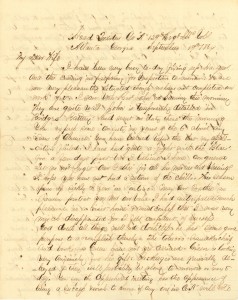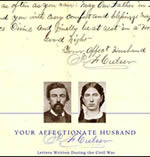 [google-map-v3 width=”400″ height=”300″ zoom=”12″ maptype=”hybrid” mapalign=”right” directionhint=”false” language=”default” poweredby=”false” maptypecontrol=”false” pancontrol=”false” zoomcontrol=”true” scalecontrol=”false” streetviewcontrol=”false” scrollwheelcontrol=”false” addmarkermashupbubble=”false” addmarkerlist=”33.748315; -84.391109{}1-default.png” bubbleautopan=”true” showbike=”false” showtraffic=”false” showpanoramio=”false”]
[google-map-v3 width=”400″ height=”300″ zoom=”12″ maptype=”hybrid” mapalign=”right” directionhint=”false” language=”default” poweredby=”false” maptypecontrol=”false” pancontrol=”false” zoomcontrol=”true” scalecontrol=”false” streetviewcontrol=”false” scrollwheelcontrol=”false” addmarkermashupbubble=”false” addmarkerlist=”33.748315; -84.391109{}1-default.png” bubbleautopan=”true” showbike=”false” showtraffic=”false” showpanoramio=”false”]
Head Quarters, Co. “A” 129th Regt. Ills. Vols.
Atlanta, Georgia September 19th 1864
My Dear Wife
I have been very busy to-day fixing up Hd. Qurs. and this evening in preparing for Inspection to-morrow. We are now very pleasantly situated though we have not completed our work yet.
I saw both Bros. John and Sammy [Murphy] this morning; they are quite well. John is temporarily detailed in “Bridges Battery” and went on duty there this morning.1
You express some anxiety in yours of the 6th about my “Leave of Absence.” You have learned before this that my application failed. I have had quite a fight with the “Blues” for a few days past, but I believe I have conquered. Let us not forget “Our Father” for all his mercies and blessings.
I hope you have not had a return of the chills. This season opens up sickly, I fear, in Pontiac. May Our Father in Heaven protect you and our babe. I had anticipated much pleasure in a visit home & must confess that I was very much disappointed, for I felt confident of success. God doeth all things well and doubtless he has some good purpose to accomplish thereby.
The tobacco, handkerchief, and book for Green have not yet arrived.2 Green is looking very anxiously for his gift. Packages are generally delayed, & they will probably be along to-morrow or next day.
You say the Copperhead meeting has the appearance of being a success & wish to know if any one in Co. “A” will vote for “Mac” [McClellan], and what probability of the 129th getting home to vote. There is no probability of the 129th going home to vote; there will be too much on hand here at that time. Had McClellan accepted the nomination upon a strong war Platform, he would have had some friends and five or six of Co. “A” would have voted for him had opportunity offered. The Chicago Platform has no friends here that I know of, and McClellan’s effort to kick aside the Platform and still accept the nomination by a strong copperhead convention has left him very few friends, indeed.3 We prefer a continuation of the policy of the present administration & do not deem it advisable or necessary to make any serious changes. The Army is for Lincoln, though Illinois and Indiana troops cannot help elect him.4
I am surprised that a Copperhead meeting should be so largely attended in our county. I hope the friends of the Union are not idle.
The Chaplain [Brother Cotton] thought when he left us that he would rest a year but has accepted an appointment to Dwight. I should have liked much to have heard his speech in Pontiac. Did you hear it, or of it?
Tell Mother [Murphy] she does not long more for me to come home than I do to be there & kiss her for me. Sister Maggie [Utley] has never written. Give my love to her & kiss the children for me.
All the Company are well. We expected the pay-master here this week, but are told this evening that he will not be here until next week. Some of the men are becoming very impatient, & I fear some of their families are in want. There is something wrong as we should have been paid a month ago. Chris [Yetter] & Nate [Hill] are flourishing as usual; they are both striving very industriously to learn to play chess. What progress have you made? Green was almost as badly disappointed in my not going home as myself. He was intending to go along.
It is 20 minutes past 11 o clock; yet, late as it is, I must close my letter to-night or it will not get out in to-morrow’s mail, as I shall be very busy in the morning.
Sherman is still shipping citizens South. I told you a short time ago that the cessation of hostilities was to continue until the 22nd of October; it is only until the 22nd of this month.5
Francis Van Doren gives rather an amusing incident that happened a few days ago.6 He is driving team in the supply train and is at present engaged in moving citizens. On one of his Loads were two young ladies, one of which was very much grieved at being compelled to leave her home & was crying and lamenting her fate, when finally she consoled herself by saying “that she had a home from which Sherman could not drive her.” Her companion, who must have considerable spice in her nature, warned her not to be too certain as Sherman might yet “flank her out of Heaven.” It does seem hard to drive women and children from their homes when there are doubtless some who are innocent of any transgression of the laws, but it is a moral impossibility to subsist the citizens when we have so large an army & so extended a base of supplies.
I think it very probable that the Campaign will open about the 1st of October.7 There is no news from Grant. All is quiet there.8 We are still ignorant of the policy Genl. Sherman will adopt or the direction the Armies will advance. God, who has been so bountiful in blessings, is still with us, & we trust will guide us to certain Victory.
The Chicago papers report Genl. A. J. Smith [is] on his way here, but I think it must be a mistake.9 We have heard nothing of him through military channels. We are looking anxiously for the result of the draft.10 We would like to see the men coming along.
I recd. a letter from the editor of the Sentinel requesting me to write an article for the paper occasionally. If I get time before the campaign opens, I will, though I have but little inclination to engage in political discussions.
All the camp is quiet & the men sleep. The moon bright and clear shines sweetiy upon us and a “Beautiful Star” is twinkling close by her. We dream of home and wonder whether in God’s good Providence we are destined to enjoy its Sweets again. Who but “He alone” can tell, and yet we hope and anticipate trusting all to Him. Let us pray for Grace to be resigned to His will. May His richest blessings rest upon you and your babe.
I can imagine you both asleep now, & I would love dearly to see the reality of my dreams. Still “All is well,” & if we only wait patiently for “God’s good time” our enjoyment will be so much the sweeter. If not on earth, yet in Heaven we may meet. Remember me very kindly to all our friends and let us not forget that we are blessed far above thousands of those around us. May Holy Angels guard you.
Good night.
Your affectionate Husband
J. F. Culver
- Bridges’ Illinois battery, like Company M, 1st Illinois Light Artillery, was assigned to the IV Corps’ Artillery Brigade. [↩]
- Albert Green, a black freedman, had attached himself to J.F.C. while the regiment was at Nashville in the autumn of 1863. [↩]
- General McClellan, embarrassed by the “peace plank,” sought to repudiate it by placing the strongest emphasis on the Union in his letter accepting the nomination. He thus went before the country as a war leader. In the campaign which followed, Democratic speakers, taking their cue from McClellan, generally avoided mention of the “peace plank,” while inveighing against Lincoln’s policies and denouncing his so-called acts of usurpation. Randall, Civil War and Reconstruction, pp. 619-20. [↩]
- No provision had been made by the legislatures of Illinois and Indiana to permit soldiers to vote by absentee ballot. To have their votes counted, soldiers from these states would have to return to their homes to cast their ballots. [↩]
- On Sept. 10, 1864, General Sherman had issued Special Field Order No. 70, announcing that a truce is declared to exist from “daylight of Monday, September 12, until daylight of Thursday, September 22, … at a point on the Macon Railroad known as Rough and Ready, and the country round about for a circle of two miles’ radius.” O. R., Ser. I, Vol. XXXIX, pt. II, p. 356. [↩]
- Francis M. Vandoren, a 24-year-old farmer, was mustered into service on Sept. 8, 1862, as a private in Company A, 129th Illinois Infantry. On April 27, 1864, he was detailed as a teamster in the supply train of the Third Division, XX Corps. In the autumn of 1864 he rejoined the company and was wounded at Averysboro, N.C., March 16, 1865. Private Vandoren was mustered out with the unit on June 8, 1865 near Washington, D.C. Compiled Service Records of Union Soldiers, NA. [↩]
- Sherman hoped to resume the campaign by October 1. When he did, he proposed to keep Hood’s Army of Tennessee employed, and put his “army group” in condition “for a march on Augusta, Columbia, and Charleston, to be ready as soon as Wilmington is sealed as to commerce, and the city of Savannah is in our possession.” Meanwhile, the Union armies with General Grant before Petersburg and those with Maj. Gen. E. R. S. Canby on the Gulf Coast would be reinforced “to the maximum.” Grant’s force would strike for Wilmington and Savannah, while Canby would “send a force to get Columbus, Ga., either by the way of the Alabama or the Apalachicola.” O. R., Ser. I, Vol. XXXIX, pt. II, pp. 358, 412. [↩]
- Following the battles of the Weldon Railroad and Reams Station in late August, Grant’s armies, having cut the Weldon Railroad south of Petersburg, paused to regroup. Grant’s next attack was scheduled for the end of September, and would consist of thrusts at opposite ends of his long line. General Butler’s Army of the James would attack north of the James, while units from General Meade’s Army of the Potomac would thrust westward from the Weldon Railroad and attempt to reach the Boydton Plank road and the Southside Railroad. [↩]
- Maj. Gen. A. J. Smith with his detachment of the Army of the Tennessee had spent most of the summer of 1864 in Western Tennessee and northern Mississippi, keeping General Forrest’s cavalry corps occupied and away from Sherman’s supply line. Smith, having accomplished his mission, had embarked his troops at Memphis, on the first leg of their trip to rejoin Sherman. Once again, as in June, Smith had to be diverted. This time it was into the trans-Mississippi to cope with Maj. Gen. Sterling Price’s column which had crossed the Arkansas and was thrusting deep into Missouri. [↩]
- President Lincoln on July 18 had issued a call for 500,000 volunteers. To fill this quota it was necessary to resort to the draft. Long, Civil War Day by Day, p. 541. [↩]

 Subscribe via RSS
Subscribe via RSS Subscribe via Email
Subscribe via Email